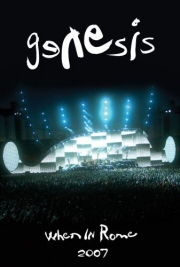 With the temperature dropping, it's time to find someone to keep you warm. Find your hookups with our online dating guide!
With the temperature dropping, it's time to find someone to keep you warm. Find your hookups with our online dating guide!
- Rock
- Unrated
- 2007
- Buy the DVD
Reviewed by Jeff Giles
()
t didn’t get a lot of press here – and what little ink it did generate was mostly focused on the absence of Peter Gabriel – but last year’s Genesis reunion tour actually played to a lot of people around the world; matter of fact, at the show this three-DVD set chronicles, the band performed in front of roughly half a million screaming Italians, none of whom seemed particularly bothered by the fact that they weren’t getting the “classic” Genesis lineup.
What exactly constitutes “classic” Genesis has been up for debate since Gabriel ankled the band in the mid ‘70s, followed closely by guitarist Steve Hackett. As the Phil Collins-fronted version molted into a chart-hogging factory for streamlined AOR and the platinum records piled up, the cries of old fans who missed the prog-laced album sides of yore became more difficult to hear – but they never stopped hoping for a return to the freewheeling early days, and when Gabriel and Hackett rejoined their old bandmates in the studio for a new recording of “The Carpet Crawlers” in 1999, hopes were high for a full-fledged reunion.
That reunion was discussed, but it ultimately never came to pass, morphing instead into a resumption of the Tony Banks/Phil Collins/Mike Rutherford lineup – and prompting derisive snorts from everyone who ever tried to divide the band’s history along the Gabriel faultline. It isn’t that simple, of course, and it never was – even the last Collins-fronted Genesis record, 1991’s painfully cheeky and too-slick We Can’t Dance, included a pair of epic tracks, and Collins, though far more fond of straight-ahead pop songcraft than any of his bandmates, has always had enough strength to float in prog waters.
So this Genesis reunion, disappointing as its ingredients might have been to some, still had plenty of potential. Did it follow through?
If all we’re using is “When in Rome”for evidence, then the answer has to be “probably not.” Though wonderfully expansive and beautifully shot, the show mostly reinforces the anti-Collins crowd’s stereotypes – the performances are clean, technically almost flawless, and mostly quite dull. This isn’t Collins’ fault, really – he remains as gratingly effusive a frontman as ever, while Rutherford and Banks remain mostly inanimate. (One of the show’s funniest bits takes place when Collins introduces Banks to the crowd, which begins screaming Banks’ name; in response, the keyboardist may raise an eyebrow, or possibly both. It’s hard to tell.) The band’s aces remain guitarist/bassist Daryl Steurmer and drummer Chester Thompson, who form a safety net around Rutherford’s workmanlike playing and Collins’ aversion to singing while drumming.
In visual terms, the show is breathtaking – the crane shots of the crowd are particularly amazing, and the stage, which features a giant LED backdrop and enormous light towers, redefines rock spectacle. All that bigness mostly just serves to overwhelm Genesis, however – which is pretty much what you’d expect, given that you’re talking about five guys, four of whom neither speak nor move for most of the show.
The set list should be of at least some interest to purists, as it avoids tilting heavily in favor of the band’s latter-day output (ignoring Abacab entirely) and gives every era fairly even coverage – which is a nice way of saying that even though they included the unctuous “Hold On My Heart,” they also made room for versions of “I Know What I Like,” “Firth of Fifth,” and “Carpet Crawlers” (which closes the show on an unexpectedly sweet high note).
The jewel of the set is its third disc, a fly-on-the-wall documentary titled “Come Rain or Shine.” It’s too long and languidly paced to be of consistent interest to anyone who isn’t a hardcore Genesis fan, but that’s basically the point – the non-faithful won’t be purchasing “When in Rome” anyway. It’s undeniably refreshing to see one of the biggest bands in the world reforming without egos getting in the way, and even if it’s hard not to wish someone in the group would occasionally show a little emotion, that stiff-upper-lip British reserve is par for the course for Genesis, and has been for quite some time. The documentary’s high point occurs at the tail end of a running subplot concerning the A/V crew’s mostly hapless efforts to match the LED display to what the band is playing on the stage, when Banks and Rutherford finally cave in to a technician’s pleadings to sit down with him and work out the changes in “Domino” with him. Seated on either side of the tech, staring at the screen and moving along with music they wrote over 20 years previous, their eyes finally light up, and the viewer gets a small taste of what drove them into the musician’s life to begin with.
That’s just one moment, though – for most of “Come Rain or Shine,” and “When in Rome” in general, you get the feeling Genesis reunited for no particular reason. None of them need the money, and none of them appear terribly comfortable with fame; the whole enormous enterprise seems to be a very carefully planned-out lark. There’s nothing inherently wrong with that – and there’s certainly nothing technically unsound about any of these performances – but there’s very little fire. As an impeccably presented souvenir, and an example of the sort of huge stadium shows that have become a rarity in the last 20 years, it does its job. Just don’t expect it to move you.
You can follow us on Twitter and Facebook for content updates. Also, sign up for our email list for weekly updates and check us out on Google+ as well.











